In my previous posts, I discussed the lost art of fermentation and our current age that hold up the idea of immediacy as the only correct way. I cannot emphasize this more: we lost the ability to wait for something. From the fast-food chain shops to the quick trip to the closest shopping centre for things that were not possible a couple of years ago. It almost feels natural to have the world at our fingertips (in some sense), as if all of history tended towards where we are right now. I stand in front of a wall of different condiments and sauces: from Tabasco to Dijon styled mustard to oyster sauce. You even have the option between different brands of the same product. We are bombarded by different choices immediately. (This is not a bad thing in itself. We have the luxury, why not use it?) This leads naturally to one being distanced from the labour and time it took to produce the products that stand in front of one like a wall. (Tabasco, for example, is aged for up to three years. This seems unreal when you don't know how it is made). Fermenting food, as discussed in my previous posts, helps with ageing and preservation. This is due, mainly, to one product: Salt.
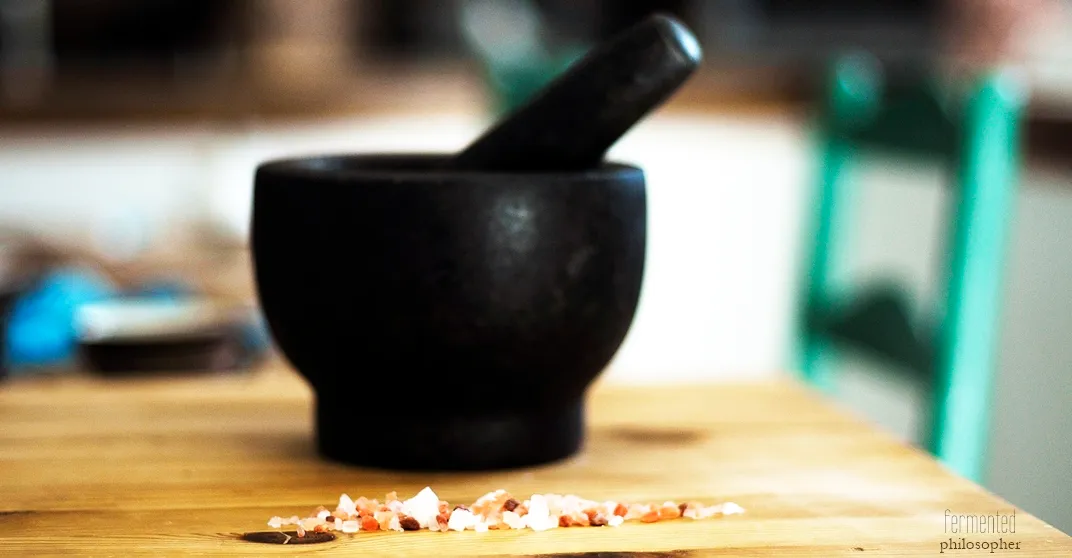
Salt and Fermentation
Salt is important for fermentation because it helps to fight unbeneficial bacteria. Salt keeps away bacteria that will cause lactic acid bacteria not to grow like it should. The use then of salt is that of cleansing. It keeps the bad bacteria away so that the good bacteria can take over and keep fermentation going on. With this, fermented food and keep longer, but it also slows down fermentation in a way. You can keep on fermenting for longer, thus the more salt you add, the longer the fermentation. This is good because of the flavour it adds. I am no expert in this region, but with a lot of things, this is true. Keeping fermenting bread overnight in the fridge (thus mimicking the use of salt) the bread develops a more intense bread flavour. By ageing meat (like salami) with the added salt, you create a flavour that cannot be mimicked. Only age can give that flavour. This is interesting, fermentation is part of the fabric of life. Why do I say this? Leave something like fruit and it will naturally ferment. Add water and flour, keep it for a week with regular feeding of new flour (nothing else), and fermentation will occur. This is fascinating and beautiful. It is a sign of life that you cannot see. In the air, on your hands, in food and between the cracks of life there are countless organisms, yeast and bacteria that live. We did not create or invent fermentation and fermented food, we only learned how to control it (and recently learned how it happened).
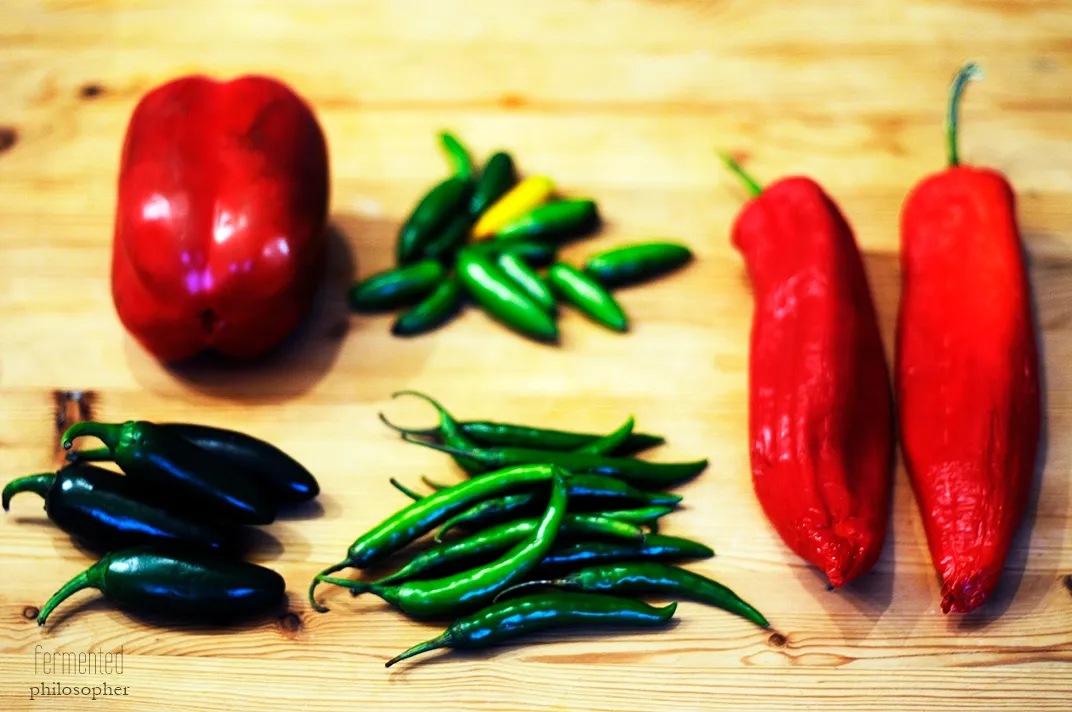
This means that life is teeming with, well, life. Anything can thus be fermented, but to control fermentation and utilising it in the right way is the art. Experimentation is key, finding what works for you and tasting what tastes right for you. This all takes time. Most "easy and quick" recipes state that you can make fermented pepper sauce in a couple of weeks, or even a couple of days. This is good, if you are looking for a quick pepper sauce, but if you are willing to take the risk and leave it for a couple of months, why not try it? That is what I asked for myself. If Tabasco sauce takes years to age, this must be beneficial. For almost no money I acquired some peppers, some hot, some not hot but sweet. I have no clue what I am doing, but is that not in a sense how life works? You dive into life head first with your eyes closed, expecting the worst but after the storm settles, you have to admit it was not that bad. Back to the peppers and yeast. As mentioned, on top of the peppers there are yeast, bacteria and organisms that are beneficial to fermentation. This requires no extra ingredients, it requires nothing but the peppers themselves and the salt. It seems to happen by itself, but we know this is not the case, it is rather that we cannot directly see what is happening.
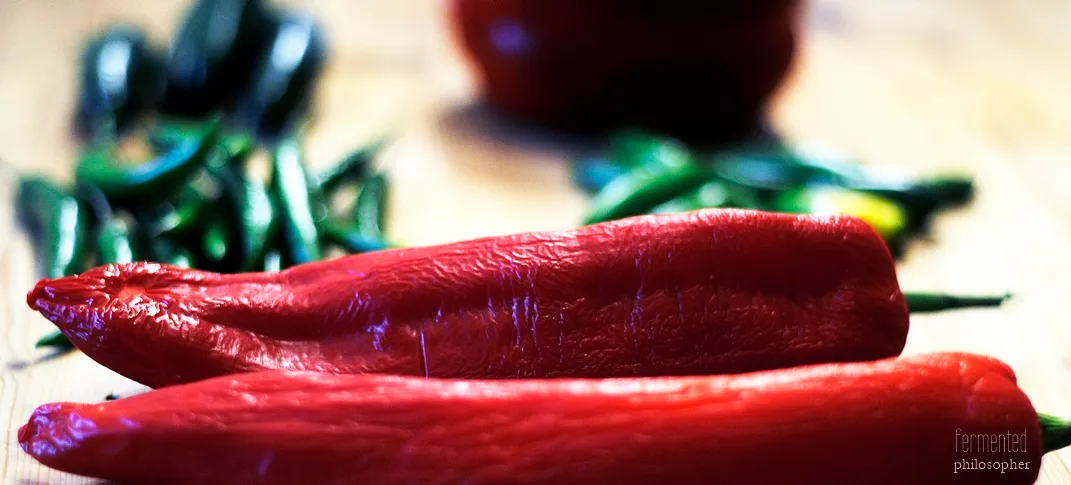
But this is not something that happens immediately. Time needs to pass so that the beneficial bacteria can grow to increase fermentation. You start with what is present, you leave it to ferment (i.e. to grow more bacteria) and wait until the fermentation stops. This is due to the acidity that rises during fermentation. This is when the product, or the fermented sauce, will be finished. Like I said I am no expert in the field. This is all an experimentation. This will lead to this post being only part one in the series. The sauce will only be ready in a months time. I am not able to sit down and wait, I stand up every couple of minutes to look at the progress, even though I know it will only be ready in a months time.
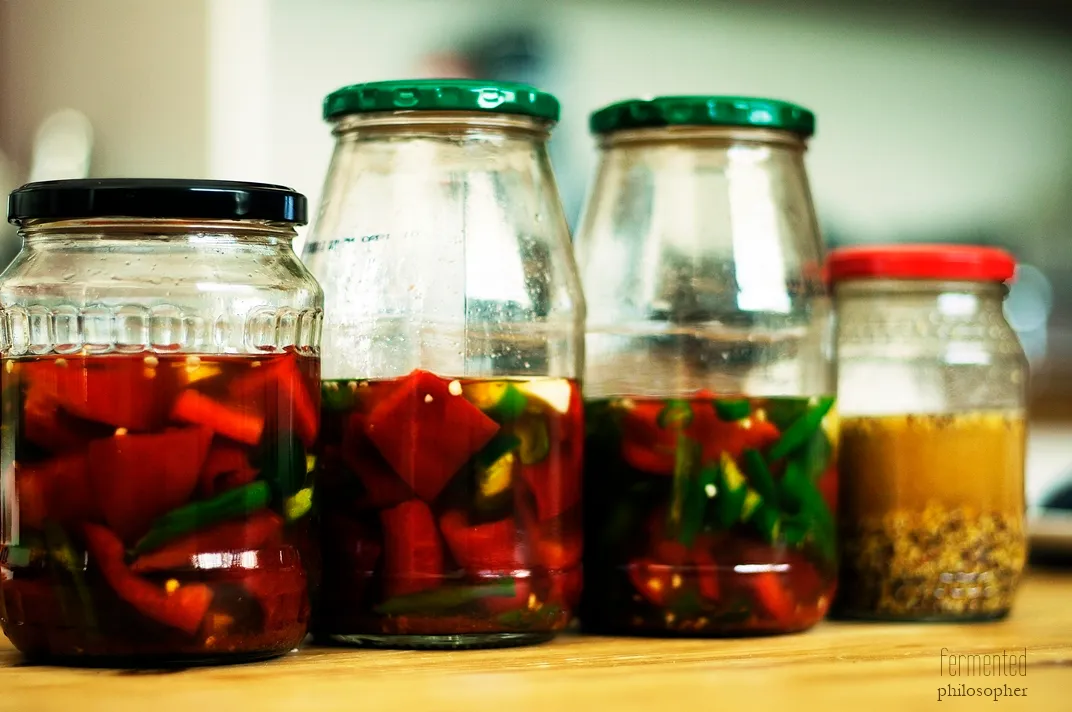
I started yesterday. I opened them this morning to "burp" them, letting the CO2 escape, and the smell was otherworldly. It had the distinct pepper smell, but there was something more to it, a meaty and savoury smell that wasn't there the previous night. In 24 hours fermentation started and the first telltale signs were there: the bubbles meaning that the yeast ate the sugars present and releasing CO2. The small things in life that make it interesting.
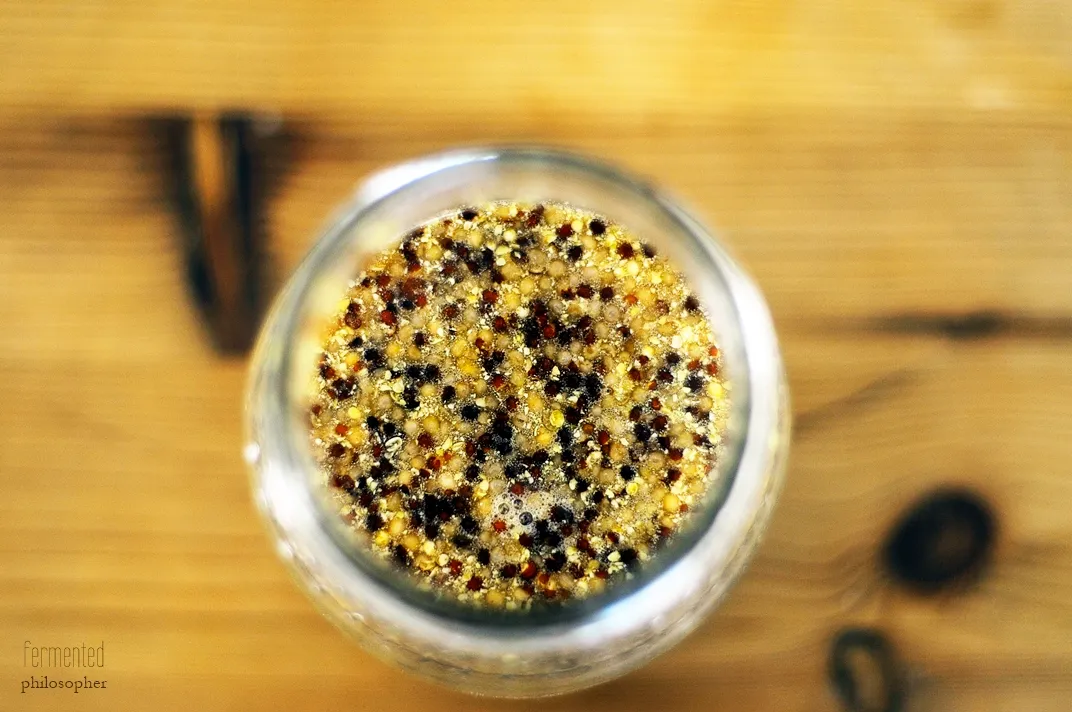
Once again, the mere fact that this happens by itself in a way, makes it feel like a small miracle. It makes you feel in control. It puts you in a place where countless people over the ages have been, you feel part of life in a weird way: someone did this before you, someone did what you are doing now, you are continuing the cycle of life. (The above picture is of mustard seeds, done in the same way as the peppers.)
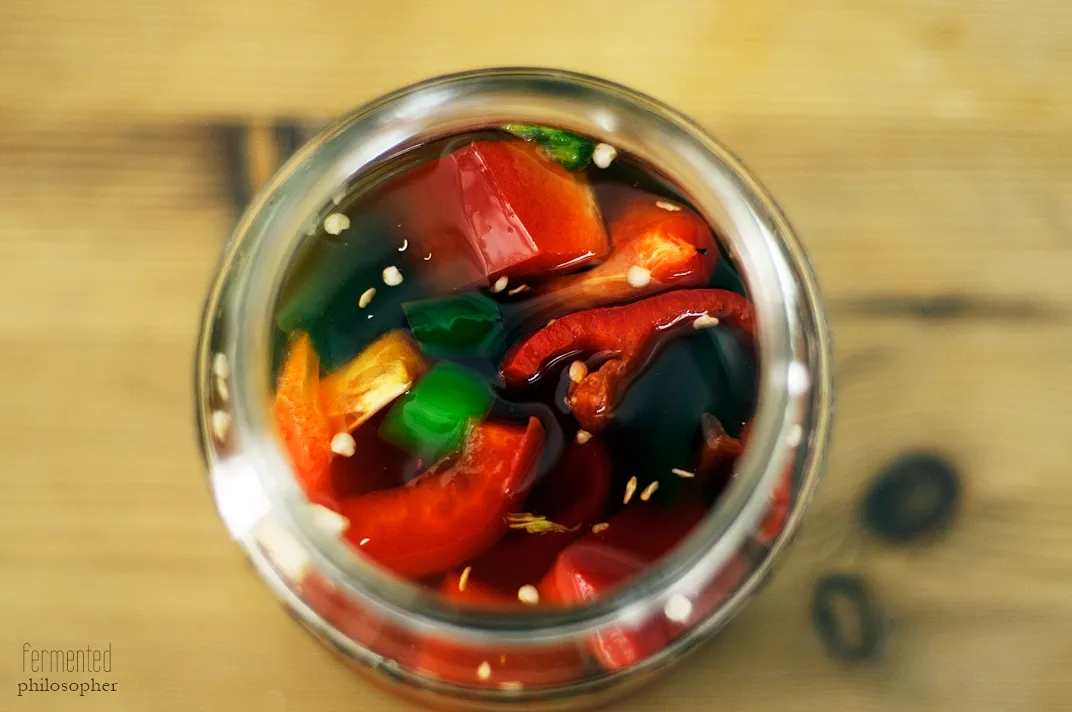
Salt and Philosophy
There is a saying: it is easier to philosophize with a full stomach. One can also add that you can "philosophize" about anything. You can make connections that do not exist, but give good arguments for why it is connected. Here I am again, trying to bridge salt and philosophy. These two seem even further away from each other than philosophy and fermentation. Give me a chance to state the argument. Salt acts, firstly, as a tool the person can use to delay fermentation, or to just lengthen fermentation. Salt is also, secondly, necessary for fermentation to happen in the first place because it, in a way, "kills" the bad bacteria and to make "space" for the necessary bacteria. Thirdly, and this is in a way already covered by my previous posts, it helps with the ageing of the product, in a way due to the last mentioned two factors. But once again, what do these three steps have to do with philosophy? Let me try and give the argument.
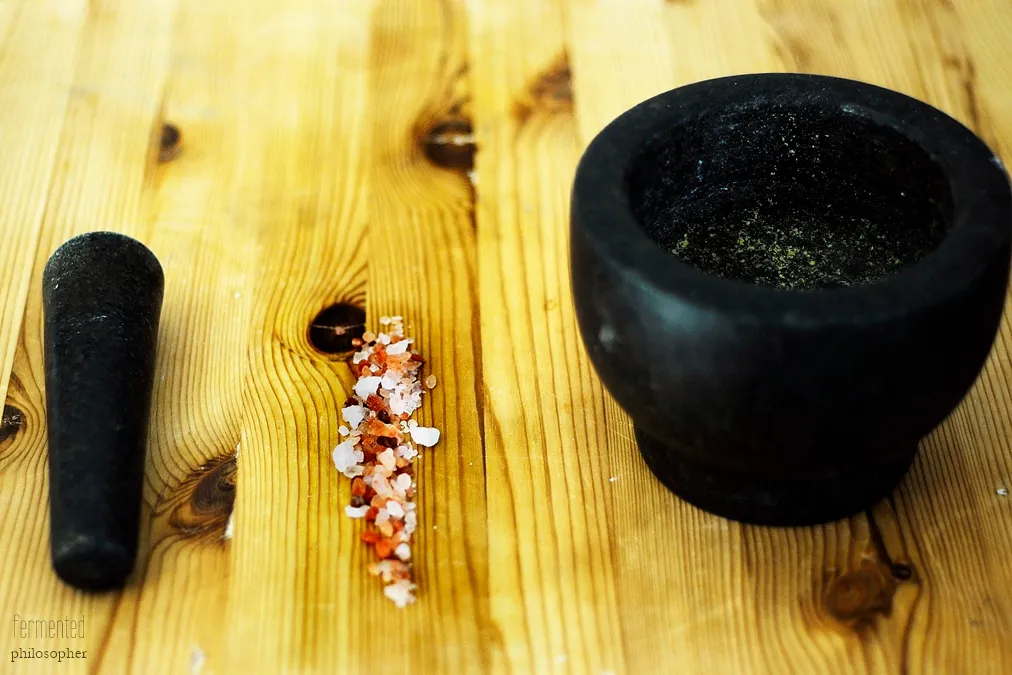
We can think of philosophy as a tool you can use in life. There are a lot of philosophers who claimed, like Michel de Montaigne, that philosophy is only a way to learn how to die properly. One can thus make the claim that, like salt delaying fermentation, philosophy delays death in a way. Why do I say this? When your mind is busy with philosophy and thinking about things, like for example death, you in a way extends your life. You extend your life, not in physical time, but when you think, you can in a way not die. This is maybe too far-fetched, but bear with me. Like salt that delays fermentation and then extending the life of the product, philosophy trains you to die, if we can believe de Montaigne. Philosophy also helps you accept your own death in the future. This makes the moment of your death seem like it should in like this way, this is the way everyone goes away. This tries to answer the above question in the following way: like salt that is necassary for fermentation to happen, and for it to extend the life of the product, so philosophy will help with the process of thinking. One needs philosophy to help you structure your mind, thus in a way killing the bad bacteria, or bad thoughts, and making place for the better thoughts. This helps you extend your life because you can do more things in life with structured thought, and it will help you make decisions that will be better for you. Philosophy, like salt and fermentation, is beneficial for the happiness and alround health of the human body. Philosophy should not be like fermentation a lost art.
